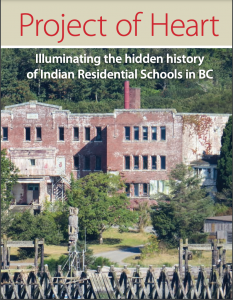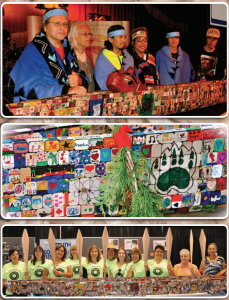This website provides stories of those individuals who were survivors in residential schools. These videos would be beneficial to share with your students as they are real stories from their time in these schools. Even though there are storybooks and videos that we can share with our students, having an individual speak about their trauma can have more of an impact, I believe. Even if you believe that your students are not ready to listen to these stories, it would be extremely beneficial for us, as educators, to listen to these real-life stories so that we can have a fuller picture of what exactly happened in these schools. These stories will allow us to understand the trauma that was faced during their time at these school, and to help us educate our students. I am not saying to tell their stories, as they are not our stories to tell, but to have more of an understanding so that we will be able to have deep conversations with our students to allow them to comprehend their Canadian history. Many of these videos were hard to listen to as their feelings are still extremely raw, however, it will be powerful for you to have a listen.
Tag Archives: Survivor Stories
Module 1: Post 3 – Project of Heart

Source: Project of Heart (2015)
Project of Heart shares the hidden history of residential schools. It is important for us as educators to understand and share the truth about residential schools to students so that the healing can start and continue to be recognized. As a student growing up in Vancouver, I did not learn about residential schools until University. That is not OK. This has to and must change.
There is history that is shared, stories from elders describing their experience, and explaining the Project of Heart. This project allowed elders to come into schools to tell their experience of being in residential schools. Students were given wooden tiles to draw what they had learned, paid tribute to those children who had died, and to also honour those survivors. Those tiles were then collected to be used in a large piece of art which became a powerful healing piece. Tsleil-Waututh carver, Derrick George, created a canoe which was where those wooden titles were placed. This piece is called the Project of Heart Commemoration Canoe which can now be found in Alert Bay at the U’mista Cultural Centre. This piece is absolutely beautiful, touching, and powerful. Below is a screenshot from the PDF that is linked to this post.

Source: Project of Heart (2015)
This resource also discusses “heart gardens” for residential school survivors. This is a project that I believe all schools should be doing each year to honour survivors and to let the healing begin and continue on.
M1, P5: Residential Schools and Canada’s Truth and Reconciliation
Note: Deeply sensitive and triggering content
This week we were reminded of the horrific treatment and genocide of Indigenous children by the Church and Government in Canada, when remains of 215 children were found at a former residential school located close to home, in Kamloops, British Columbia, Canada. I cannot find the words to express my anger and sadness with this and my heart and thoughts are with all of the survivors, families, and Indigenous communities who are having to deal with the trauma caused by our government.
I could not do a post this week without thinking about this and looking into resources to do with residential schools. I came across a three-part podcast series called Residential Schools hosted by Shaneen Robinson-Desjarlais and created by Historica Canada. The podcasts share experiences by First Nations, Métis, and Inuit survivors of residential schools, as well as their families and communities. The stories they share are so vivid, personal, heart wrenching as well as triggering for many. This podcast series is part of a Residential Schools in Canada: History and Legacy Education Guide that I was able to find through the podcast. The guide includes activities, images, stories, and videos to discuss residential schools in Canada and lead to questions about our current education system, as well as what actions we are taking towards reconciliation.
I also looked into the National Centre for Truth and Reconciliation website and exploring and discovering an abundance of information that I could learn from and hopefully then incorporate into my teaching. There are various reports available, such as the Truth and Reconciliation Commission of Canada: Calls to Action, educational resources by grades and various programs and events, such as Every Child Matters, and a memorial “to forever remember and honour the children who never returned home from residential schools.” There is still a lot I do not know about Truth and Reconciliation and I need to do better.
Schools are supposed to be one of the places children trust, but that is not always the case. As a teacher, I need to let my students know they are cared for, safe, and matter. Everyday.
Historica Canada. (2021). Residential Schools in Canada: History and Legacy Education Guide. Historica Canada. http://education.historicacanada.ca/en/tools/647
The Canadian Encyclopedia. (2020, Feb. 21). Residential Schools Podcast Series. The Canadian Encyclopedia. https://www.thecanadianencyclopedia.ca/en/article/residential-schools-podcast-series
The Canadian Press. (2021, May 28). Remains of 251 children found at former residential school in British Columbia. APTN News. https://www.aptnnews.ca/national-news/remains-of-215-children-found-at-former-residential-school-in-british-columbia/
The National Centre for Truth and Reconciliation. (2021). https://nctr.ca/